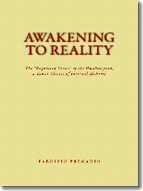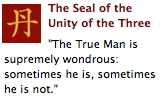Awakening to Reality (Wuzhen pian)
Poem 3: Commentary by Liu Yiming
Translated by Fabrizio Pregadio
Reproduced from:
Awakening to Reality: A Taoist Classic of Internal Alchemy
Translated by Fabrizio Pregadio
Golden Elixir Press, 2009
Paperback ● Kindle ● PDF
The Wuzhen pian (Awakening to Reality) is one of the most important and best-known Taoist alchemical texts. Written in the 11th century, it describes in a poetical form several facets of Neidan, or Internal Alchemy. Read more on this book.
 This page is part of a series on the Awakening to Reality. See the complete index.
This page is part of a series on the Awakening to Reality. See the complete index.
Text
1 學仙須是學天仙,惟有金丹最的端。 3 二物會時情性合,五行全處龍虎蟠。 5 本因戊己為媒娉,遂使夫妻鎮合歡。 7 只候功成朝北闕,九霞光裏駕翔鸞。
Translation
| 1 | If you study immortality, |
| you should study celestial immortality: | |
| only the Golden Elixir | |
| is the highest principle. | |
| 3 | When the two things meet, |
| emotions and nature join one another; | |
| where the five agents are whole, | |
| Dragon and Tiger coil. | |
| 5 | Rely in the first place on wu and ji |
| that act as go-betweens, | |
| then let husband and wife | |
| join together and rejoice. | |
| 7 | Just wait until your work is achieved |
| to have audience at the Northern Portal, | |
| and in the radiance of a ninefold mist | |
| you will ride a soaring phoenix. |
Commentary by Liu Yiming
Commentary on line 1: "If you study immortality, you should study celestial immortality."
Those who fulfill both their nature and their existence, who have a body outside their body, whose form and spirit are both wondrous,(1) who are joined in their reality with the Dao, are celestial immortals. . . . Only the celestial immortals shed their illusory body and achieve a dharmākaya (fashen, the body of Buddhahood), go beyond creation and transformation,(2) and are without birth and without death. Being able to shed life and death, their longevity equals that of Heaven, and they last eternally without decaying.
(1) As remarked above, this expression — which authors of Neidan texts use often — refers to the state of non-duality between formlessness and form, the Dao and the world, the absolute and the relative.
(2) I.e., they go beyond the manifested cosmos, which is ruled by change and impermanence.
Translations from the Wuzhen pian
● Poem 3
● Poem 7
Translations from Cultivating the Tao, by Liu Yiming
● True and False Body and Mind
● Precelestial and Postcelestial Yin and Yang
● The One Opening of the Mysterious Barrier
● Superior Virtue and Inferior Virtue
Related pages
Commentary on line 2: "Only the Golden Elixir is the highest principle."
Human beings receive this Golden Elixir from Heaven. It is perfectly good with nothing bad in it, it is innate knowledge (liangzhi) and innate capacity (liangneng).(1) It is the Numinous Root, entirely achieved and with nothing lacking. It is the Breath of precelestial Perfect Yang. . . .
Golden Elixir is another name for one's fundamental Nature (xing), inchoate and yet accomplished.(2) There is no other Golden Elixir outside one's fundamental nature. Every human being has this Golden Elixir complete in oneself: it is entirely achieved in everyone. It is neither more in a sage, nor less in an ordinary person. It is the seed of the Immortals and the Buddhas, the root of the worthies and the sages.
However, when it is not refined by fire, Yang culminates and necessarily becomes Yin, completion culminates and necessarily becomes lacking. One falls into the postcelestial state. . . . Therefore the sages of antiquity established the Way of the Return [to the original state] through the Golden Elixir, so that everyone could go back to one's home and recognize one's ancestor, and revert to what one fundamentally and originally has in oneself.
(1) The terms "innate knowledge" and "innate capacity" derive from one of the main Confucian texts, the Mengzi (chapter 7): "What one is able to do without learning is called innate capacity; what one knows without pondering is called innate knowledge."
(2) By using the term "inchoate and yet accomplished" (hun), Liu Yiming immediately suggests the affinity between one's original nature and the Dao. "There is something inchoate and yet accomplished, born before Heaven and Earth. . . . I do not know its name, but call it Dao" (Daode jing, chapter 25).
Commentary on lines 3-4: "When the two things meet, emotions and nature join one another; where the five agents are whole, Dragon and Tiger coil." [This passage provides an example of how Liu Yiming explains the relation between the precelestial and the postcelestial states of being.]
The Way of Cultivating the Elixir (xiudan) is nothing more than harmonizing the firm and the yielding, making strength and compliance match one another, and making nature and emotions join with one another. When nature and emotions join, Yin and Yang meet and the five agents are whole. This is the boundless norm of Heaven.
The five agents are the five breaths of Metal, Wood, Water, Fire and Soil. In the precelestial state, these five breaths are the five origins,(1) namely Original Nature, Original Emotions, Original Essence, Original Spirit, and Original Breath. In the postcelestial state they are the "five things" (wuwu), namely the wandering hun-soul, the ghostly po-soul, the Yin essences, the cognitive spirit (shishen), and the errant intention.(2)
The five origins include the five virtues, which are benevolence, righteousness, propriety, wisdom, and sincerity.(3) The "five things" include the "five thieves" (wuzei), which are pleasure, anger, grief, joy, and lust. When the five agents are whole, the precelestial and postcelestial are gathered together, and the five origins control the "five things."
(1) I.e., the basic constituents of the human being in their original, uncorrupted state.
(2) On the hun-soul and the po-soul see above the note to Poem 10, lines 3-4. On the Yin essences see above the note to Poem 9, line 1. The "discriminating spirit" is the thinking mind. The "errant intention" is the common intention, different from the True Intention that makes the joining of Yin and Yang possible; see above the note to Poem 3, line 5.
(3) These are the five so-called "Confucian" virtues.
Commentary on lines 5-6: "Rely in the first place on wu and ji that act as go-betweens, then let husband and wife join together and rejoice."
After the original fundament of the precelestial state is lost and scattered, nature goes east and emotions go west,(1) and the firm and the yielding do not respond to one another. If there is no harmonizing thing that goes back and forth and mediates,(2) "that" and "this" separate and do not know one another.(3) What harmonizes is the two Soils, namely wu and ji.(4) The wu-Soil rules on movement and pertains to Yang. The ji-Soil rules on quiescence, and pertains to Yin. . . .
Within the five virtues, the two Soils, wu and ji, are true sincerity. When true sincerity is in the center, one's nature is stable. When true stability functions on the outside, one's emotions are harmonized. When nature is stable and emotions are harmonized, nature and emotions go back to the root: husband and wife join together and rejoice.
(1) These words should be understood in a quite "literal" sense. See table 3, which shows that nature corresponds to the agent Wood (east), and emotions to the agent Metal (west).
(2) The term translated as "mediate," tongxin, literally means "to transmit a message," and refers to the function of Soil in bringing Yin and Yang to join one another (see the note to Poem 3, line 5). At the same time, xin also means "sincerity," the virtue associated with Soil mentioned by Liu Yiming in the next paragraph.
(3) "This" (ci) and "that" (bi, lit. the "other") are conventional terms in Neidan for the postcelestial and the precelestial, the "ten thousand things" and the Dao, the relative and the absolute, and other analogous pairs of notions or entities.
(4) See the note to Poem 3, line 5.
Commentary on lines 7-8: "Just wait until your work is achieved to have audience at the Northern Portal, and in the radiance of a ninefold mist you will ride a soaring phoenix."
When benevolence, righteousness, propriety, and wisdom go back to the oneness of sincerity, and when nature, emotions, essence, and spirit meet in the One Breath, "the three families see one another,"(1) and "the five breaths have audience at the Origin."(2) You return to the origin and revert to the fundament, and the Golden Elixir coalesces; some call it the Embryo of Sainthood.
Continue to advance in your practice, passing from "doing" into "non-doing." Nourish [the Embryo] warmly for ten months, keeping it tightly closed [within the womb].(3) Lessen the excess of strong emotions, and augment the insufficiency of compliant nature.(4) Using the celestial True Fire, and relying on the hexagrams Zhun  in the morning and Meng
in the morning and Meng  at night, smelt away the postcelestial Yin breaths.(5) Generate the immaterial from the material, passing from the subtle to the apparent. When the Breath is complete and Spirit is whole, "with a peal of thunder the golden cicada sheds its shell,"(6) and you have a body outside your body.
at night, smelt away the postcelestial Yin breaths.(5) Generate the immaterial from the material, passing from the subtle to the apparent. When the Breath is complete and Spirit is whole, "with a peal of thunder the golden cicada sheds its shell,"(6) and you have a body outside your body.
When the work is completed and your name is recorded,(7) you will have audience at the Northern Portal and will ride a soaring phoenix. You will fly and rise in the broad daylight,(8) and will become a Celestial Immortal of Pure Yang, free from death. Wouldn't that be pleasant?
(1) These words are quoted from Poem 14, line 6.
(2) This expression is found in many Neidan texts.
(3) Note the emphasis given on "closing," also found in texts of External Alchemy where it applies, in a literal sense, to hermetically sealing the crucible.
(4) "Lessen" (chou) and "augment" (tian) are two other technical terms used in many Neidan texts. At this stage of the practice, Lead should be "lessened" and Mercury should be "augmented."
(5) This sentence refers to one of the ways in which the "fire phases" are represented in Internal Alchemy. Sixty of the sixty-four hexagrams are associated with the thirty days of the lunar month. One pair of hexagrams, therefore, rules on each day; the first hexagram rules on its first half, and the second one, on its second half. Zhun and Meng are the first two hexagrams used in this cosmological pattern.
(6) This is another expression found in many Taoist texts. It alludes to achieving an "immortal self," which Liu Yiming refers to at the end of the present sentence by saying, "you have a body outside your body."
(7) That is, one's name is entered in the "registers of immortality," according to the classical Taoist image for the achievement of transcendence.
(8) This sentence, which is frequent in Taoist texts, alludes to attaining the highest state of transcendence.
 Read a detailed explanation of this poem.
Read a detailed explanation of this poem.
© Golden Elixir Press 2023










